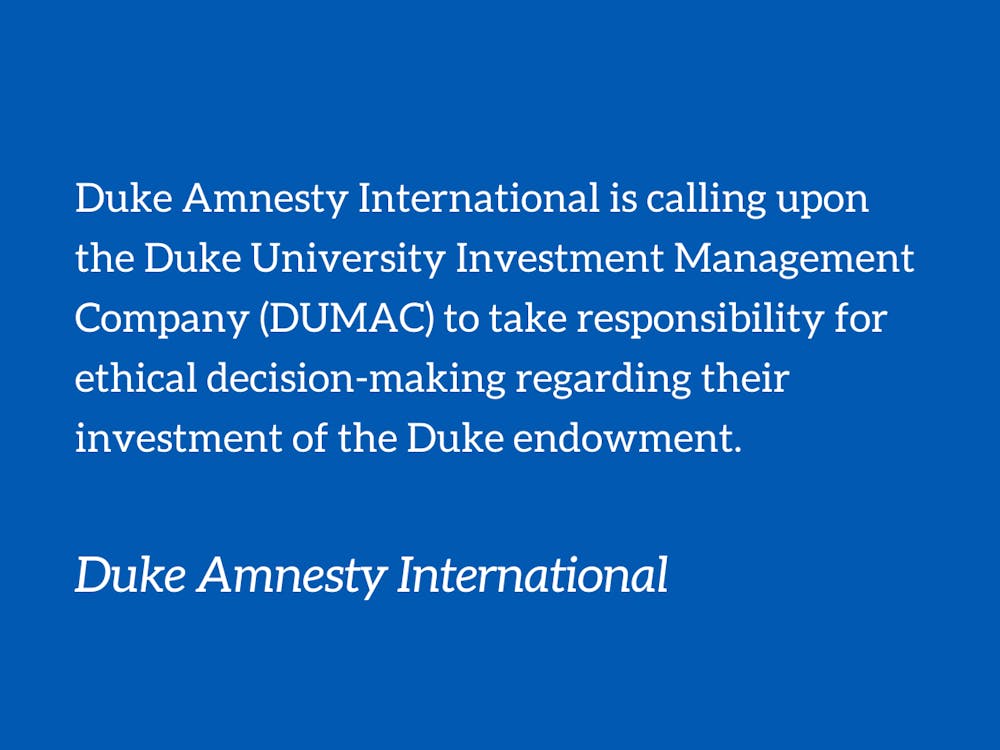Duke Amnesty International is calling upon the Duke University Investment Management Company (DUMAC) to take responsibility for ethical decision-making regarding their investment of the Duke endowment.
In April of this year, Amnesty International released a report titled “Failing Grade: How University Investment Offices Often Fail to Conduct Human Rights Due Diligence When Investing in Venture Capital Funds.” The report analyzed the venture capital investments of the 10 American universities with the largest endowments in terms of human rights due diligence.
Duke received a failing grade of 17 out of 40 in terms of human rights due diligence and investment transparency — a D.
Human rights due diligence for investors is defined by Amnesty International as “identifying human rights impacts linked to their operations and investments (both potential and actual), taking effective action to prevent and mitigate against them, and being transparent about their efforts in this regard.”
Duke has failed to demonstrate such due diligence on a number of fronts.
First, Duke is not a signatory to the UN Principles of Responsible Investment, which outlines a number of commitments to consider environmental, social and corporate governance (ESG) issues with investment decisions. A number of Duke’s peer institutions, including Harvard and the UC system, are signatories.
DUMAC’s ESG policy is vague and ineffective. In the “Responsibility” section of the DUMAC’s website, the organization claims to be “dedicated to adapting [their] processes and actions to ensure that [they] are incorporating ESG considerations in a way that aligns with industry best practices and delivers value to [their] clients.”
However, DUMAC operates by coordinating with a number of external investment managers over whom they appear to have little real oversight. In 2022, DUMAC established a framework to assess the ESG footprint of their investments in line with sustainable development goals, and they explain on their website that they “collaborate and try to understand” the ESG policies of investment manager partner companies. In a student town hall held on October 25 by the Advisory Committee on Investment Responsibility (ACIR), though, Chief Operating Officer of DUMAC Anil Madhok revealed that only 70% of the organization’s investment manager partners have formal ESG policies in place. Although this represents an improvement from an estimated 30% in 2018, this failure to incorporate universal ESG policies in Duke’s investment practices is unacceptable.
Duke also received abysmal scores for investment disclosure and transparency in the “Failing Grade” report: zero out of nine possible points. Duke was reproved for failing to disclose its investment holdings to the public, ESG performance data in their annual reports, and its proxy voting records to the public.
In response to a question posed by Duke Amnesty International during the ACIR’s student town hall last month, DUMAC’s Head of Legal and Compliance Robert McGrail stated that the organization has “enhanced the transparency” on DUMAC’s website since the release of Amnesty’s “Failing Grade” report. If transparency has been enhanced, it has not been done in a way that is easily accessible to the general public, as Duke Amnesty International found no information on DUMAC’s investment decisions on the website.
The final area of concern is accessibility. In attempting to address our concerns with Duke’s investment practices, Duke Amnesty International ran into a number of roadblocks.
After reaching out directly to the President of DUMAC, Neal Triplett, we were informed that DUMAC does not engage with student groups or individual students to discuss investment matters. Instead, all questions and concerns are redirected to the ACIR, whose purpose is to advise the President on investment recommendations he makes to the Board of Trustees. The Board then makes recommendations to DUMAC, which engages with external investment management companies for the final investments. Such a roundabout process does not facilitate student engagement with the governing bodies over the Duke endowment and instead keeps them several degrees removed from the process.
Even engaging with the ACIR through the defined grievance process presents students with difficulties. The ACIR holds student town halls once a year to hear questions and concerns from students about investment practices. In the most recent one on October 25, newly-appointed chair of the ACIR Emma Rasiel expressed the committee’s willingness to hold such forums more frequently, noting that there would be one planned for Spring 2024.
The ACIR does not take meetings with students but invites them to submit formal reports outlining their concerns. The timeline for communication after these reports is unclear, though. On occasion, groups have gone over a year without a response from the committee, as is the case with the most recent formal report from Duke Climate Coalition that was submitted in December 2022 and has still received no written response.
Duke Amnesty International is currently in the process of submitting a formal report for consideration, and we hope it to be met thoughtfully and in a more timely fashion than past reports have been. Given this arduous process, we decided it was important to educate the Duke student population on the university’s investment due diligence failings through this guest column.
The student body deserves to know whether their university’s operations are being funded responsibly and in line with Duke’s institutional values. Duke Amnesty International asks DUMAC to reform its investment responsibility practices by engaging in human rights due diligence, improving investment transparency, and amending the grievance process to better facilitate communication with community stakeholders.
Get The Chronicle straight to your inbox
Signup for our weekly newsletter. Cancel at any time.

